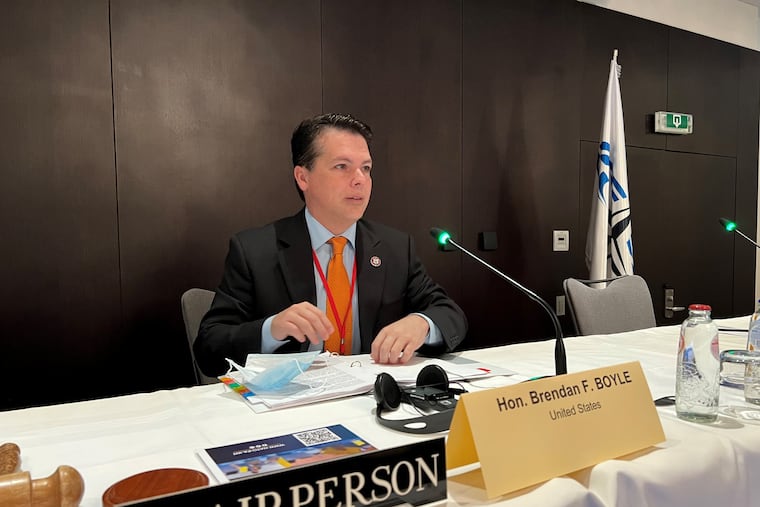Brendan Boyle: I saw in Brussels how NATO nations have united like never before against Putin | Opinion
Fresh from leading the U.S. delegation to the NATO Parliamentary Assembly in Brussels this past week, Congressman Brendan Boyle reflects on the need to come together as Russia invades Ukraine.

Growing up in the 1980s, I have vivid memories of the Cold War. I recall listening closely to neighbors’ debates about whether we were falling behind the Soviets, passionately rooting for Team USA against the despised USSR in sports, and watching fictional TV shows about what life in the aftermath of a nuclear war would look like.
Then came that day in November 1989, when the unthinkable happened. All afternoon and evening, the Big 3 TV networks — there was no 24/7 news cycle back then, let alone internet — broke into regular programming with special reports. A little-known bureaucrat named Günter Schabowski stunningly announced on East German television that citizens could travel to West Germany, effective immediately. Within hours, hordes of East Germans flocked to the Berlin Wall, literally chipping away at it with hammers. The armed soldiers opened the gates. No shots were fired.
Just like that, the Berlin Wall ceased to exist, signaling the end of the Cold War.
» READ MORE: Why Putin’s Ukraine aggression will change the world: An explainer on how we got here | Trudy Rubin
In the beginning of 1989, every Eastern European country was Communist and under Soviet domination. By the end of 1989, every one of those nations was free. Only two years later, the Soviet Union itself ceased to exist. In ways both large and small, conscious and unconscious, my worldview was formed by this experience.
As I flew back home to Philadelphia after leading the U.S. delegation to the NATO Parliamentary Assembly in Brussels this past week, I could not help but reflect upon the seminal importance of this moment.
Another person whose worldview was also shaped by the fall of the Soviet Union was Russian President Vladimir Putin, who once said the collapse of the Soviet Union was “the greatest geopolitical catastrophe of the century.” I’ve thought of that quote often this week, as his warmongering toward Ukraine has brought us to the brink of global crisis.
Those who implicate the United States or NATO for spurring Putin’s actions, as Thomas L. Friedman recently did in his New York Times column, are dangerously naive. This is all about one thing for Putin: restoring a long-lost empire and reclaiming Mother Russia’s glory.
However, Putin has badly miscalculated.
He has united the 30 NATO nations as I have never seen before. I experienced this firsthand in Brussels this week.
Typically, NATO Parliament sessions include internal bickering. Parliamentarians from the Baltic states, for example, push for stronger statements and actions, while those from France and Germany tend to resist. Sometimes the delegations from Turkey and Greece will hijack a meeting to argue over their long-running bilateral disputes. But none of that happened in Brussels this week.
I observed a remarkable resolve and seriousness of purpose. My European colleagues spoke passionately, and sometimes quite emotionally, about what war in Europe means for them. One member with whom I spoke recalled with tears in his eyes what it was like to grow up in the ruins of World War II. He spoke of older relatives he never got the chance to meet, killed in the war.
For us Americans, the world wars fought in Europe are events that happened “over there.” But for my European colleagues, it is markedly different, intensely more personal.
Putin and his oligarch enablers must pay an incredibly severe, personal price for their actions. The retaliatory efforts we have begun to take are a good start, but they must only be a start. If the United States and NATO fail to respond with appropriate strength, then Putin will likely take steps that could lead to the deaths of many civilians and cause potentially irreparable harm to Ukraine, and the world. We are dangerously close to the first large-scale land war in Europe since April 1945, when Nazi Germany surrendered.
The recent days should, if nothing else, forever silence those who doubt the central necessity of American power. In a time like this, we are the one nation that free people look toward for help and leadership. For in the end, the only thing that will stop a full-scale land war in Europe and contain Putin’s aggression is the rock-solid resolve of the United States of America.
Brendan F. Boyle is a member of Congress from Pennsylvania and chair of the U.S. delegation to the NATO Parliamentary Assembly.